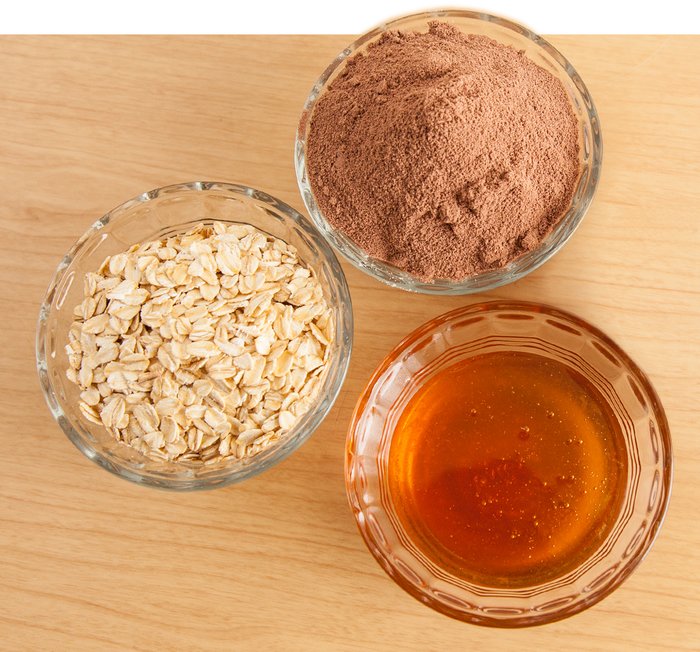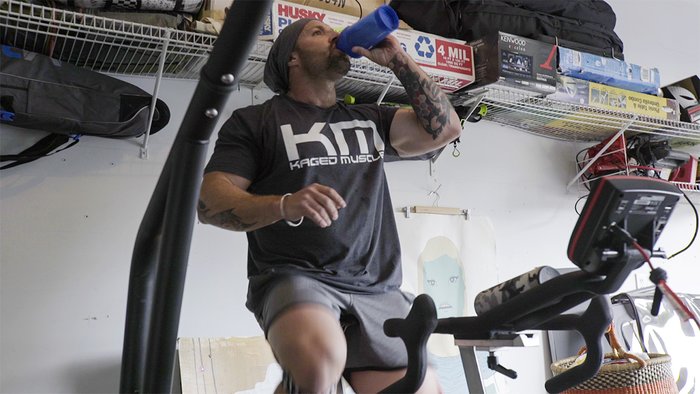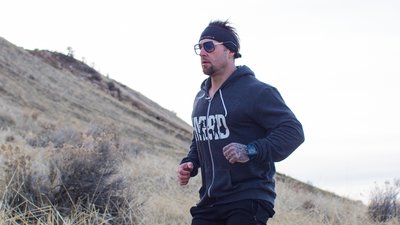Top endurance athletes and bodybuilders have a lot more in common than they might think (or perhaps be willing to admit). Most prominently, they both thrive when they can control as many variables as possible—and often work against themselves by trying new things on competition day.
This is one reason why Kris Gethin, a longtime bodybuilder who is now throwing himself into the rigors of Ironman-triathlon training, has taken so well to the rigors of being a "hybrid athlete."
"I'm a prep freak," Kris says. "I like to be prepared, because what happens if you don't prepare? You prepare to fail."
Here's how Kris fueled for his recent half-Ironman. Each choice was backed by science, but also tested repeatedly before race day—because, as Kris says and all athletes have to learn one way or another, "Knowledge without mileage is bullshit."
Whatever You Do, Practice It
There are countless nutrition and supplementation protocols for athletes of all types. No matter what yours is, Kris advises, don't wait until the last minute to make sure it works. Practice it, just like you practice your sport in training!
Kris brings up an example from the world of bodybuilding, where competitors notoriously pig out backstage on wine and candy, then end up looking bloated. In a triathlon or race, the equivalent would be taking a supplement or food on race day that you never touched during training, simply because it's available at an aid station. Why would you be surprised when it upsets your stomach in the middle of the race?
The moral, according to Kris: "Do not go into an event without practicing. You want your body to be accustomed."
So what do you do at the aid station if you're not eating and drinking? Kris says to take that water and just pour it over your head.
Start Race Day With Carbs and Protein

Before Kris ever enters the water, he's fueled up on a blend that includes:
- High-performance carbs from oats
- Honey
- Fast-digesting protein
And he does it early. When you've got a long day ahead of you, there's nothing to be gained by cutting it close. Think hours, not minutes.
Separate "Supps" and "Fuel"
During the epic bike ride of a triathlon, Kris has two types of bottles. One is full of water, electrolytes (in the form of Kaged Muscle Hydra-Charge), and Kris' preferred performance supps:
- Glutamine for recovery and muscle preservation
- Branched-chain amino acids for endurance
- Citrulline for fatigue management and blood flow
- Taurine for mental focus
The other bottle has protein and any supplemental carbs he takes (as well as more of the above supps). Both are essential, but they serve different purposes. One is pure performance and hydration; the other is calories, protein and fuel.

Don't Forget the BCAAs!
Wondering which of those supplements is the most important? Kris is clear about that.
"I always include branched-chain amino acids as my number one supplement when I'm doing these three disciplines," he says. "I feel like I do not have the lactic buildup, and I do not have the fatigue as I would without it."
This is his in-the-trenches perspective, but there is research to back it up. Studies have found that BCAAs can reduce both muscle damage and markers of fatigue during endurance exercise, but also enhance exercise capacity when muscle glycogen is depleted.[1,2].

If that doesn't sound perfect for the rigors of race day, what does?
Save Caffeine for When You Need It
If you're an experienced lifter, you may like to take a pre-workout prior to training. But long-form endurance sports demand a different mindset, and a different approach to caffeination.
In a triathlon, Kris waits until the second or third leg, when he needs "a little oomph," to take supplemental caffeine. And even then, he takes either a single caffeine pill, or the lightly caffeinated intra-workout In-Kaged, rather than a full-bore pre-workout.
It's not caffeine that's going to make or break your race day—it's your training. But studies have repeatedly shown that caffeine can help with fatigue management, perceived exertion, and focus in endurance athletes.[3-6]
And don't worry about dehydration; as Krissy Kendall, PhD, and Ciaran Fairman discussed in "The Top 7 Supplements to Boost Endurance Performance," studies have shown caffeine doesn't cause any negative effects on hydration.[7]
Find Your Bar
Along with his supp and fuel bottles, Kris has tried numerous bars. The two that ended up taped to his bike during the race, Backcountry Bar and Picky Bar, had a lot in common. They're packed with dates, seeds, whole-food-based carbs and proteins, and are easy to unwrap and chew even while riding. This isn't a picnic!
No matter what food you carry during epic training or racing, you can't go wrong with these rules: Look for adequate protein, a natural ingredient profile, good taste, and—most importantly—make sure they agree with your stomach. Don't wait until race day to find out!
References
- Kim, D.-H., Kim, S.-H., Jeong, W.-S., & Lee, H.-Y. (2013). Effect of BCAA intake during endurance exercises on fatigue substances, muscle damage substances, and energy metabolism substances. Journal of Exercise Nutrition & Biochemistry, 17(4), 169–180.
- Gualano, A. B., Bozza, T., Lopes, D. C. P., Roschel, H., Dos Santos, C. A., Luiz, M. M., ... & Herbert, L. J. A. (2011). Branched-chain amino acids supplementation enhances exercise capacity and lipid oxidation during endurance exercise after muscle glycogen depletion. The Journal of Sports Medicine and Physical Fitness, 51(1), 82-88.
- Desbrow, B., Biddulph, C., Devlin, B., Grant, G. D., Anoopkumar-Dukie, S., & Leveritt, M. D. (2012). The effects of different doses of caffeine on endurance cycling time trial performance. Journal of Sports Sciences, 30(2), 115-120.
- Glaister, M., Pattison, J. R., Muniz-Pumares, D., Patterson, S. D., & Foley, P. (2015). Effects of Dietary Nitrate, Caffeine, and Their Combination on 20-km Cycling Time Trial Performance. The Journal of Strength & Conditioning Research, 29(1), 165-174.
- Bridge, C. A., & Jones, M. A. (2006). The effect of caffeine ingestion on 8 km run performance in a field setting. Journal of Sports Sciences, 24(4), 433-439.
- Stadheim, H., Kvamme, B., Olsen, R., Drevon, C., Ivy, J., & Jensen, J. (2013). Caffeine Increases Performance in Cross-country Double-Poling Time Trial Exercise. Medicine & Science in Sports & Exercise, 45(11), 2175-2183.
- Armstrong, L. E., Casa, D. J., Maresh, C. M., & Ganio, M. S. (2007). Caffeine, fluid-electrolyte balance, temperature regulation, and exercise-heat tolerance. Exercise and Sport Sciences Reviews, 35(3), 135-140.

